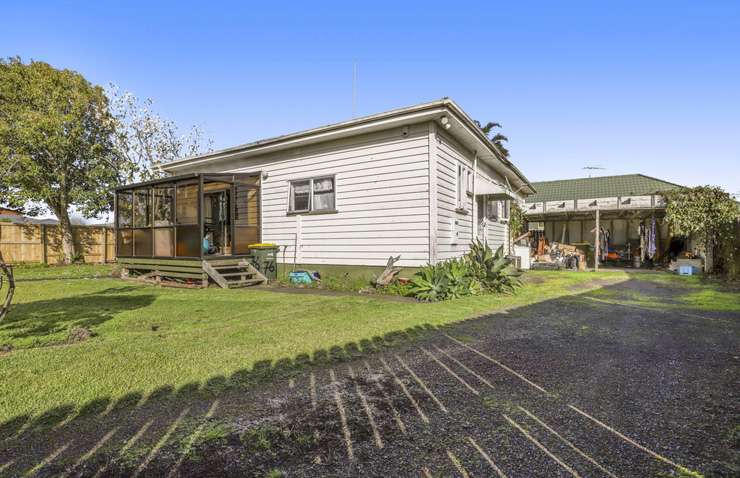Some homeowners struggling to sell their houses in a sluggish market may need to start pulling out all the stops to get people through the door and a contract over the line, especially if it’s failed to sell in the first few weeks.
And with the latest REINZ figures revealing it is now taking an average of 44 days to sell a house, up from 31 last year, panic maybe setting in for some vendors, especially if they have already committed to a purchase elsewhere.
If holding on to the property isn’t an option, getting the presentation right, dropping the price and boosting the marketing spend could be the answer to getting a sale.
Unique marketing techniques are emerging where vendors have used their divorce proceedings as a marketing tool, run a campaign slashing $50,000 a week off the asking price or revealing the auction reserve before auction day to grab people’s attention.
Start your property search
Barfoot & Thompson Pt Chevalier agent Simon Lu recently “slashed” the price of a property he is selling at 2/33 Monteith Crescent in Remuera by $110,000 and added the tagline “fire sale required” as the property has been sitting on the market for three months.
Lu said the overseas seller had initially rejected an offer of $1.05 million, opting to hold out for a better price on auction day. When the property didn’t get any bids at auction and the person who made the original offer bought elsewhere, the owner decided to drop the asking price from $1.098m to $988,000.
He said the term “fire sale” is in reference to the owner wanting an urgent sale and if it doesn’t sell soon, the back-up plan is to pull it from the market and rent it out.
The Monteith Crescent property is just one of dozens of properties that have had their prices slashed, sometimes between $50,000 and $100,000.

A three-bedroom house at 76 Manuroa Road in Takanini, Auckland, is being advertised as the cheapest freehold in Takanini. Photo / Supplied
Lodge managing director Jeremy O’Rourke said the asking price needs to be spot on in the current market so it looks like the best-value proposition.
“In this type of market, you need to be tight to market and you want to be tight to market right from the start, so not putting on any sort of premium because you think you are going to be negotiated with,” he said. “Don’t leave a lot of fat in it.”
If the property isn’t selling, a price reduction can help along with taking a good look at it to see if it can be better presented, including getting the property staged which more people are doing. O’Rourke said.
“I think presentation has become way more important and it’s just giving people an understanding sometimes of what they might not be able to see. The way we live in our house may not be the same way somebody new wants to enjoy it and, particularly vacant houses, it brings them to life and showcases them.”
Boosting the advertising budget to buy premium spots or rejigging the marketing can also help, and recently several properties are being called at Lodge’s auction rooms with a publicised auction reserve.
“Typically, when that happens the reserve price is low enough to grab people’s attention and get them bidding. The idea being is it just gets more people across their doorstep. We have seen those types of techniques to grab people’s attention and bring them through the property.”
Property Ventures Real Estate director Mark Honeybone said if a property isn’t selling, then the agent and seller need to look at why that is and be honest about it.
“It could be the price; it could be because something hasn’t been consented and that’s obviously a big one ... and you need to maybe fix it up.”
While he isn’t generally a big fan of pricing a property, Honeybone said it seems to be the best approach in the current market. He lists a property as being for sale by negotiation for the first two weeks to get market feedback before adding an asking price.
“At the moment people, moreso than ever, really want to see prices. I hate listing with prices, but at the moment that’s a good strategy right now is to put a price because the phones are ringing as soon as you put a price on it.”
The price also needs to be right because while investors and renovators were back in the market, they were also after a great deal and would just find another property if they disagreed about its worth.

Harcourts Glenfield agent David Ding says the first three to four weeks are usually the “golden selling period”. Photo / Fiona Goodall
Honeybone had just this week sold a property on Manuroa Road in Takanini after the vendor dropped the $795,000 price by about $50,000. Three previous buyers had been wanting to pay around the mid-$700,000 mark, but bought elsewhere when the seller said no. A week went by before another buyer showed interest and this time the seller decided to accept the offer rather than wait a couple of months in case the price dropped further.
Both Honeybone and Harcourts Glenfield agent David Ding said they are always honest with their sellers and ask them why they are selling because if they are not in a hurry then sometimes the best option can be to hold onto the property for now.
“What’s your motivation for selling? Can you stick in this situation for more than three years – if you can then rent it out and don’t sell, if you can’t then sell sooner than later.”
Ding said the first three to four weeks were usually the “golden selling period” when top dollar could be achieved. If the property didn’t sell in that time, then the seller should put a price on it and if the price is “sharp” they should see more people attending the open homes. If dropping the price doesn’t work, then it could be time to spend more on marketing to push the listing further up as the longer they are on the market the further down the search list they fall.
Bayleys David Rainbow said reducing the price doesn’t always work and sometimes a different marketing approach is needed.
“Sometimes you’ve to go through almost another advertising campaign and I’ve had properties which we’ve advertised them once, twice or three times to get an effect. It’s just finding that buyer out there. If that house hasn’t sold, the advert or heading could be changed with a different photo or re-home staged or tweaked up. Finding the buyer is the hardest thing and it’s hard to sell a secret so you’ve got to keep on advertising it to promote the property.”
While Honeybone suggested changing agents if the seller wasn’t happy with how it was going, Rainbow disagreed, saying he doesn’t think it will make a difference.
“There’s a lot of work that goes in by the agent to get a sale so that agent is keen to get a sale as much as the vendor is.”
Rainbow hasn’t personally used headlines to indicate a seller’s urgency and because anyone selling at the moment usually has a good reason and the recent ones he has come across include downsizing or moving into a retirement home.

















































































